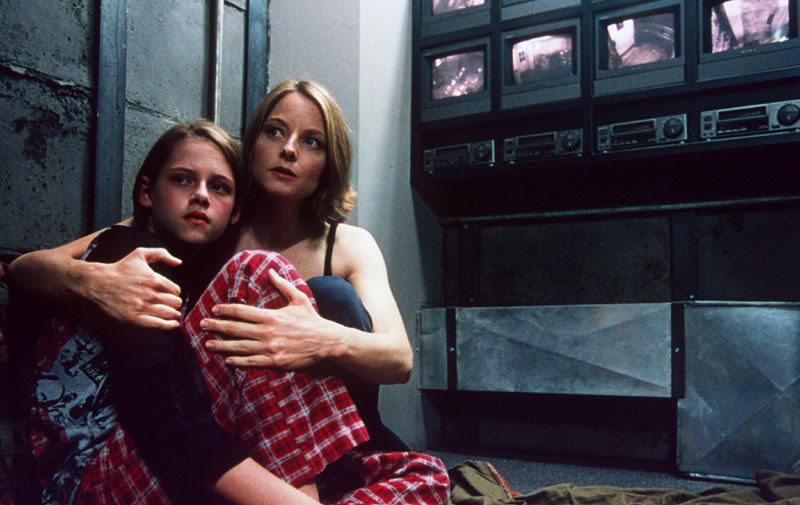Panic Room (2002)
DIRECTOR: David Fincher
CAST:
Jodie Foster, Kristen Stewart, Forest Whitaker, Jared Leto, Dwight Yoakam, Patrick Bauchau
REVIEW:
A slickly-crafted thriller that doesn’t quite reach the Hitchcockian levels it obviously aspires towards, but is good for a couple hours of engrossing entertainment nonetheless, Panic Room is the most pleasure to savor as a chess game between characters who, refreshingly and rarely, aren’t always two steps behind the audience.
Recently-divorced mom Meg Altman (Jodie Foster) and young daughter Sarah (Kristen Stewart) are spending their first night in a large Manhattan brownstone that comes equipped with a panic room as an impregnable haven from home invasion. And it’s not long before the somewhat foreboding room comes in handy, when three robbers, hulking Burnham (Forest Whitaker), manic Junior (Jared Leto), and masked sociopath Raoul (Dwight Yoakam) invade the mansion. Meg and Sarah make it into the panic room, but their troubles are only beginning, because what the thieves are after happens to be inside the room too.
 The plot is basic thriller stuff, and hits some usual cliches: Meg divorced her wealthy husband (Patrick Bauchau) when he left her for another woman, and the three robbers are a mismatched trio made up of archetypes: Burnham, the ‘good’ thief who doesn’t want to hurt anyone, Junior, the inept young punk who’s not as in control as he thinks he is, and Raoul, the loose cannon homicidal maniac. It’s also not the first or last thriller in which the child turns out to have an emergency medical situation while trapped in the room (see Signs). There are a couple factors that keep the suspense level a little lower than it’s intended to be. With the exception of Raoul, the thieves aren’t a threatening bunch. Junior is too inept to be a serious threat, and Burnham, while the most competent of the robbers, is also the one with the most compunction, and we know he’s not going to kill Meg and Sarah even if he catches them. The only real menace comes from Sarah threatening to slip into diabetic shock while trapped away from her insulin, and the question of how much and for how long Burnham and Junior are going to be able to control Raoul.
The plot is basic thriller stuff, and hits some usual cliches: Meg divorced her wealthy husband (Patrick Bauchau) when he left her for another woman, and the three robbers are a mismatched trio made up of archetypes: Burnham, the ‘good’ thief who doesn’t want to hurt anyone, Junior, the inept young punk who’s not as in control as he thinks he is, and Raoul, the loose cannon homicidal maniac. It’s also not the first or last thriller in which the child turns out to have an emergency medical situation while trapped in the room (see Signs). There are a couple factors that keep the suspense level a little lower than it’s intended to be. With the exception of Raoul, the thieves aren’t a threatening bunch. Junior is too inept to be a serious threat, and Burnham, while the most competent of the robbers, is also the one with the most compunction, and we know he’s not going to kill Meg and Sarah even if he catches them. The only real menace comes from Sarah threatening to slip into diabetic shock while trapped away from her insulin, and the question of how much and for how long Burnham and Junior are going to be able to control Raoul.
This is much more a vehicle for the plot, in which the characters are pawns, but Jodie Foster (who replaced Nicole Kidman when she had to bow out due to an injury) and Forest Whitaker are effective as the two characters between whom it comes down most to an often clever game of cat-and-mouse. As she did in Flightplan, Foster commits to an on-the-surface unchallenging thriller role with focus and intensity. It’s nice to see a movie in which the characters act credibly intelligent. Neither Meg nor Burnham can afford to concede, and maneuver around each other in a high-stakes chess match. Kristen Stewart holds her own alongside her distinguished older co-stars, and she and Foster hold our attention because they develop a connection that feels credible. Jared Leto plays Junior like he injected himself with uppers before each scene, and unlike some villains, Dwight Yoakam is equally creepy with or without the mask, although we don’t see his face until the last third or so of the movie (in my opinion, Yoakam is more menacing here than in his much-praised turn as the abusive husband in Sling Blade).
As anyone who’s seen a David Fincher movie before should expect, the camera in Panic Room has a personality. Early on, we get an impressively fluid continuous tracking shot that takes us from Meg’s bedroom down flights of stairs and through rooms, to the window where the figures of the robbers appear. Sometimes Fincher’s stylistic flourishes threaten to get a little ‘look at what I can do!’, such as when the camera goes inside a keyhole and inside a flashlight bulb, apparently just to show us it can, but he gives Panic Room a distinctive visual flair. The look is slightly desaturated, and the tone is cold and almost cerebral. The movie isn’t quite the nail-bitingly tense adrenaline rush it wants to be, but the fun comes from watching smart characters who can think on their feet. Thrillers where we can’t telegraph every move the characters are making before they’re making it are rare enough that it’s worth savoring one when we find it, and that is the primary pleasure of Panic Room.
***